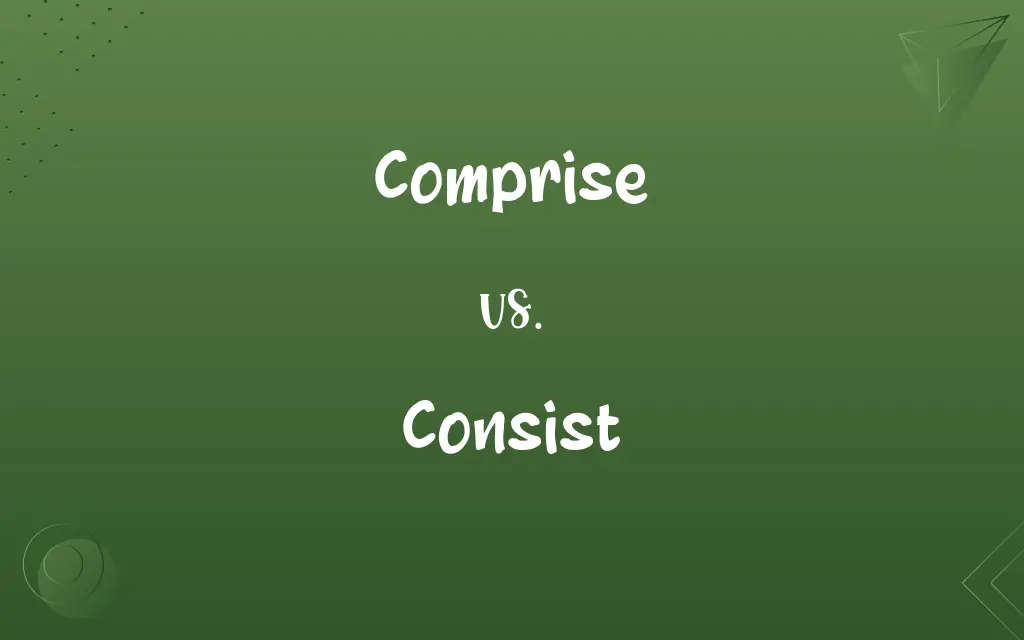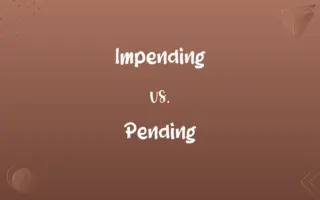Comprise vs. Consist: Know the Difference

By Shumaila Saeed || Updated on December 25, 2023
Comprise means to include or contain as a part of a whole, whereas consist means to be made up or composed of certain components.

Key Differences
Comprise refers to including or containing all parts, elements, or members of something within a whole. Consist, on the other hand, focuses on the composition or makeup of a thing, describing what it is made up of or includes.
Shumaila Saeed
Nov 27, 2023
When using comprise, the whole is typically mentioned first, followed by its parts. In contrast, when using consist, the parts or components are usually mentioned first, followed by the whole they make up.
Shumaila Saeed
Nov 27, 2023
The word comprise is often used in a broader sense, indicating that a whole encompasses all its components. Consist is more specific, detailing the elements or substances that form the entirety of something.
Shumaila Saeed
Nov 27, 2023
Comprise suggests a complete inclusion of parts within a whole, implying that nothing is left out. In contrast, consist can imply that the parts mentioned are a representative, but not necessarily exhaustive, list of what constitutes the whole.
Shumaila Saeed
Nov 27, 2023
In practical usage, comprise is often used to express the idea of 'consisting of,' especially in formal or technical contexts. Consist, however, is frequently used to describe the composition of more complex or abstract entities, like groups or substances.
Shumaila Saeed
Nov 27, 2023
ADVERTISEMENT
Comparison Chart
Definition
To include or contain as parts of a whole
To be made up or composed of
Shumaila Saeed
Nov 27, 2023
Implication
Complete inclusion of all parts
Parts are representative of the whole
Shumaila Saeed
Nov 27, 2023
Context
Often used in formal or technical contexts
Used to describe complex or abstract compositions
Shumaila Saeed
Nov 27, 2023
Example
"The committee comprises ten members."
"The committee consists of representatives from various departments."
Shumaila Saeed
Nov 27, 2023
ADVERTISEMENT
Comprise and Consist Definitions
Comprise
Comprise means to include or embrace all parts of something.
The book comprises ten chapters.
Shumaila Saeed
Nov 27, 2023
Consist
To consist is to be formed or derived from.
The group consists mainly of volunteers.
Shumaila Saeed
Nov 27, 2023
Comprise
To comprise is to constitute or form.
The jury is comprised of twelve individuals.
Shumaila Saeed
Nov 27, 2023
Consist
To consist is to have as an essential feature or element.
The test consists of twenty questions.
Shumaila Saeed
Nov 27, 2023
Comprise
Comprise can mean to consist of.
The course comprises lectures and practical workshops.
Shumaila Saeed
Nov 27, 2023
ADVERTISEMENT
Consist
Consist can mean to be based on or depend on.
The theory consists on several key principles.
Shumaila Saeed
Nov 27, 2023
Comprise
To comprise is to make up or compose a whole.
The collection comprises rare artifacts.
Shumaila Saeed
Nov 27, 2023
Consist
Consist means to be made up of or composed.
The meal consists of three courses.
Shumaila Saeed
Nov 27, 2023
Comprise
Comprise implies the whole is greater than the sum of its parts.
The team comprises players from six countries.
Shumaila Saeed
Nov 27, 2023
Consist
Consist implies the composition of elements in a whole.
The committee consists of experts from various fields.
Shumaila Saeed
Nov 27, 2023
Comprise
To be composed of or contain
The staff comprises eight physicians, two dozen nurses, and various administrative people.
Shumaila Saeed
Oct 19, 2023
Consist
To be made up or composed
New York City consists of five boroughs. See Usage Note at include.
Shumaila Saeed
Oct 19, 2023
Comprise
Usage Problem To compose; make up; constitute
The countries and territories that comprised the British Empire.
Shumaila Saeed
Oct 19, 2023
Consist
To have a basis; reside or lie
The beauty of the artist's style consists in its simplicity.
Shumaila Saeed
Oct 19, 2023
Comprise
(transitive) To be made up of; to consist of (especially a comprehensive list of parts).
The whole comprises the parts.
The parts are comprised by the whole.
Shumaila Saeed
Oct 19, 2023
Comprise
To compose; to constitute.In the passive voice, the use of of with comprise (is/are comprised of) may be regarded as tautological because the same meaning can be expressed in the active (comprises) without of, or with composed of, which is both synonymous and non-tautological (since compose in this sense always requires of).
The whole is comprised of the parts.
The parts comprise the whole.
Shumaila Saeed
Oct 19, 2023
Comprise
To contain or embrace.
Our committee comprises a president, secretary, treasurer and five other members.
Shumaila Saeed
Oct 19, 2023
Comprise
(patent law) To include, contain, or be made up of, defining the minimum elements, whether essential or inessential to define an invention.
Shumaila Saeed
Oct 19, 2023
Comprise
To comprehend; to include.
Comprise much matter in few words.
Friendship does two souls in one comprise.
Shumaila Saeed
Oct 19, 2023
Consist
To be composed, formed, or made up (of).
The greeting package consists of some brochures, a pen, and a notepad.
Shumaila Saeed
Oct 19, 2023
Comprise
Be composed of;
The land he conquered comprised several provinces
What does this dish consist of?
Shumaila Saeed
Oct 19, 2023
Consist
(rail transport) A lineup or sequence of railroad carriages or cars, with or without a locomotive, that form a unit.
The train's consist included a baggage car, four passenger cars, and a diner.
Shumaila Saeed
Oct 19, 2023
Comprise
Include or contain; have as a component;
A totally new idea is comprised in this paper
The record contains many old songs from the 1930's
Shumaila Saeed
Oct 19, 2023
Consist
To stand firm; to be in a fixed or permanent state, as a body composed of parts in union or connection; to hold together; to be; to exist; to subsist; to be supported and maintained.
He is before all things, and by him all things consist.
Shumaila Saeed
Oct 19, 2023
Comprise
Form or compose;
This money is my only income
The stone wall was the backdrop for the performance
These constitute my entire belonging
The children made up the chorus
This sum represents my entire income for a year
These few men comprise his entire army
Shumaila Saeed
Oct 19, 2023
Consist
To be composed or made up; - followed by of.
The land would consist of plains and valleys.
Shumaila Saeed
Oct 19, 2023
Consist
To have as its substance or character, or as its foundation; to be; - followed by in.
If their purgation did consist in words.
A man's life consisteth not in the abundance of the things which he possesseth.
Shumaila Saeed
Oct 19, 2023
Consist
To be consistent or harmonious; to be in accordance; - formerly used absolutely, now followed by with.
This was a consisting story.
Health consists with temperance alone.
For orders and degreesJar not with liberty, but well consist.
Shumaila Saeed
Oct 19, 2023
Consist
Originate (in);
The problems dwell in the social injustices in this country
Shumaila Saeed
Oct 19, 2023
Consist
Have its essential character; be comprised or contained in; be embodied in;
The payment consists in food
What does love consist in?
Shumaila Saeed
Oct 19, 2023
Consist
Be consistent in form, tenor, or character; be congruous;
Desires are to be satisfied only so far as consists with an approved end
Shumaila Saeed
Oct 19, 2023
Consist
Be composed of;
The land he conquered comprised several provinces
What does this dish consist of?
Shumaila Saeed
Oct 19, 2023
Repeatedly Asked Queries
Is comprise used in formal writing?
Yes, comprise is often used in formal or technical contexts.
Shumaila Saeed
Nov 27, 2023
What does comprise mean?
Comprise means to include or contain parts as a whole.
Shumaila Saeed
Nov 27, 2023
Can comprise and consist be used interchangeably?
In many contexts, they can, but their usage patterns differ.
Shumaila Saeed
Nov 27, 2023
In which context is consist more suitable?
Consist is suitable for discussing complex or abstract compositions.
Shumaila Saeed
Nov 27, 2023
What is a common mistake with 'comprise'?
A common mistake is using "comprised of" instead of "comprises."
Shumaila Saeed
Nov 27, 2023
How do you correctly use consist?
Use consist to describe what makes up the whole, e.g., "The meal consists of soup, salad, and dessert."
Shumaila Saeed
Nov 27, 2023
Can comprise be used for abstract concepts?
Yes, it can be used for both concrete and abstract entities.
Shumaila Saeed
Nov 27, 2023
Does consist imply a complete list?
No, consist often suggests a representative but not exhaustive list.
Shumaila Saeed
Nov 27, 2023
How is comprise different in implication?
Comprise implies a whole inclusive of all its parts.
Shumaila Saeed
Nov 27, 2023
What does consist mean?
Consist means to be made up of specific components.
Shumaila Saeed
Nov 27, 2023
Does consist focus more on the elements?
Yes, it focuses on the elements or parts of the whole.
Shumaila Saeed
Nov 27, 2023
Can comprise be followed by 'of'?
Traditionally, "comprise" should not be followed by "of," though this usage is common.
Shumaila Saeed
Nov 27, 2023
Does comprise indicate a larger concept?
Yes, comprise often suggests a more encompassing whole.
Shumaila Saeed
Nov 27, 2023
Is consist appropriate for physical compositions?
Yes, especially for describing components of a tangible whole.
Shumaila Saeed
Nov 27, 2023
What is an example of using comprise?
"The team comprises players, coaches, and staff."
Shumaila Saeed
Nov 27, 2023
Does comprise require detailed listing?
No, it implies a whole without needing detailed listing of all parts.
Shumaila Saeed
Nov 27, 2023
Is one more formal than the other?
Comprise is generally considered more formal than consist.
Shumaila Saeed
Nov 27, 2023
How do you correctly use comprise?
Use comprise to indicate what the whole includes, e.g., "The zoo comprises various animals."
Shumaila Saeed
Nov 27, 2023
What is an example of using consist?
"The team consists of players from various backgrounds."
Shumaila Saeed
Nov 27, 2023
Share this page
Link for your blog / website
HTML
Link to share via messenger
About Author
Written by
Shumaila SaeedShumaila Saeed, an expert content creator with 6 years of experience, specializes in distilling complex topics into easily digestible comparisons, shining a light on the nuances that both inform and educate readers with clarity and accuracy.









































































